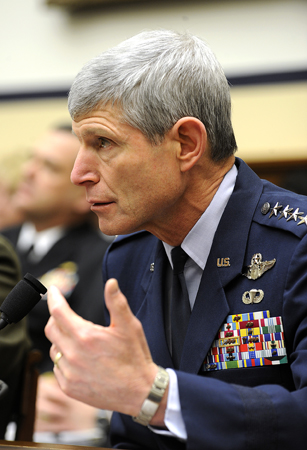Chief  of Staff Gen. Norton Schwartz said Thursday he still thinks it’s moderately risky for military effectiveness to end the ban on homosexuals openly serving in the US military during a time of war. But he noted that he’s grown more comfortable with implementing this policy change as he’s watched the service execute its preparations. “I’m not prepared to fall off of my assessment of moderate risk,” Schwartz told the House Armed Services Committee Thursday. He continued, “But we have trained 100,000-plus airmen to date, and the way we have approached this and the reaction that we have experienced thus far indicates to me that we are mitigating the risk. . . . And so, I am more comfortable than I was” when President Obama enacted the Don’t Ask, Don’t Tell repeal last December. “But we still have a ways to go, and it requires the constant attention of all of us to bring this home,” added Schwartz. He appeared before the committee with the uniformed leadership of the other services to discuss this issue.
of Staff Gen. Norton Schwartz said Thursday he still thinks it’s moderately risky for military effectiveness to end the ban on homosexuals openly serving in the US military during a time of war. But he noted that he’s grown more comfortable with implementing this policy change as he’s watched the service execute its preparations. “I’m not prepared to fall off of my assessment of moderate risk,” Schwartz told the House Armed Services Committee Thursday. He continued, “But we have trained 100,000-plus airmen to date, and the way we have approached this and the reaction that we have experienced thus far indicates to me that we are mitigating the risk. . . . And so, I am more comfortable than I was” when President Obama enacted the Don’t Ask, Don’t Tell repeal last December. “But we still have a ways to go, and it requires the constant attention of all of us to bring this home,” added Schwartz. He appeared before the committee with the uniformed leadership of the other services to discuss this issue.
The U.S. military is sending more fighter jets to the Middle East to step up its war with Iran, adding to what is already the largest buildup of airpower in the region since the 2003 invasion of Iraq. For now, the operation shows little sign of coming to a quick…